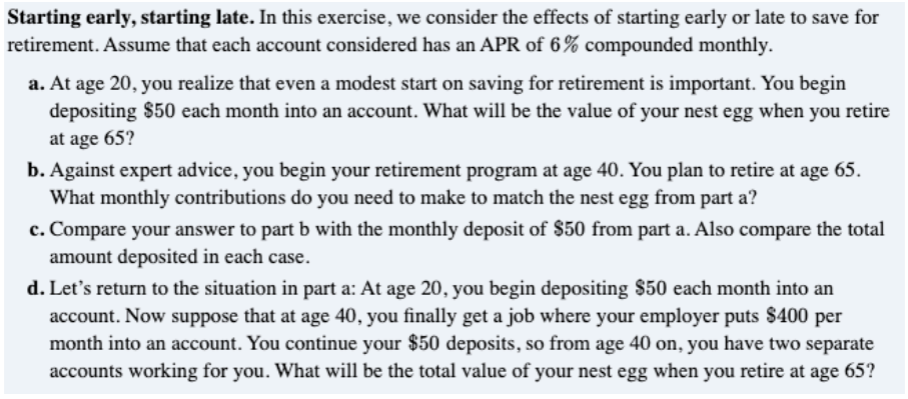Starting early, starting late. In this exercise, we consider the effects of starting early or late to save for retirement. Assume that each account considered has an APR of 6% compounded monthly. a. At age 20, you realize that even a modest start on saving for retirement is important. You begin depositing $50 each month into an account. What will be the value of your nest egg when you retire at age 65? b. Against expert advice, you begin your retirement program at age 40. You plan to retire at age 65. What monthly contributions do you need to make to match the nest egg from part a? c. Compare your answer to part b with the monthly deposit of $50 from part a. Also compare the total amount deposited in each case.
Starting early, starting late. In this exercise, we consider the effects of starting early or late to save for retirement. Assume that each account considered has an APR of 6% compounded monthly. a. At age 20, you realize that even a modest start on saving for retirement is important. You begin depositing $50 each month into an account. What will be the value of your nest egg when you retire at age 65? b. Against expert advice, you begin your retirement program at age 40. You plan to retire at age 65. What monthly contributions do you need to make to match the nest egg from part a? c. Compare your answer to part b with the monthly deposit of $50 from part a. Also compare the total amount deposited in each case.
Chapter5: The Time Value Of Money
Section: Chapter Questions
Problem 44P
Related questions
Question

Transcribed Image Text:Starting early, starting late. In this exercise, we consider the effects of starting early or late to save for
retirement. Assume that each account considered has an APR of 6% compounded monthly.
a. At age 20, you realize that even a modest start on saving for retirement is important. You begin
depositing $50 each month into an account. What will be the value of your nest egg when you retire
at age 65?
b. Against expert advice, you begin your retirement program at age 40. You plan to retire at age 65.
What monthly contributions do you need to make to match the nest egg from part a?
c. Compare your answer to part b with the monthly deposit of $50 from part a. Also compare the total
amount deposited in each case.
d. Let's return to the situation in part a: At age 20, you begin depositing $50 each month into an
account. Now suppose that at age 40, you finally get a job where your employer puts $400 per
month into an account. You continue your $50 deposits, so from age 40 on, you have two separate
accounts working for you. What will be the total value of your nest egg when you retire at age 65?
Expert Solution
This question has been solved!
Explore an expertly crafted, step-by-step solution for a thorough understanding of key concepts.
This is a popular solution!
Trending now
This is a popular solution!
Step by step
Solved in 2 steps

Knowledge Booster
Learn more about
Need a deep-dive on the concept behind this application? Look no further. Learn more about this topic, accounting and related others by exploring similar questions and additional content below.Recommended textbooks for you

EBK CONTEMPORARY FINANCIAL MANAGEMENT
Finance
ISBN:
9781337514835
Author:
MOYER
Publisher:
CENGAGE LEARNING - CONSIGNMENT



EBK CONTEMPORARY FINANCIAL MANAGEMENT
Finance
ISBN:
9781337514835
Author:
MOYER
Publisher:
CENGAGE LEARNING - CONSIGNMENT



Cornerstones of Financial Accounting
Accounting
ISBN:
9781337690881
Author:
Jay Rich, Jeff Jones
Publisher:
Cengage Learning

Pfin (with Mindtap, 1 Term Printed Access Card) (…
Finance
ISBN:
9780357033609
Author:
Randall Billingsley, Lawrence J. Gitman, Michael D. Joehnk
Publisher:
Cengage Learning

Principles of Accounting Volume 2
Accounting
ISBN:
9781947172609
Author:
OpenStax
Publisher:
OpenStax College